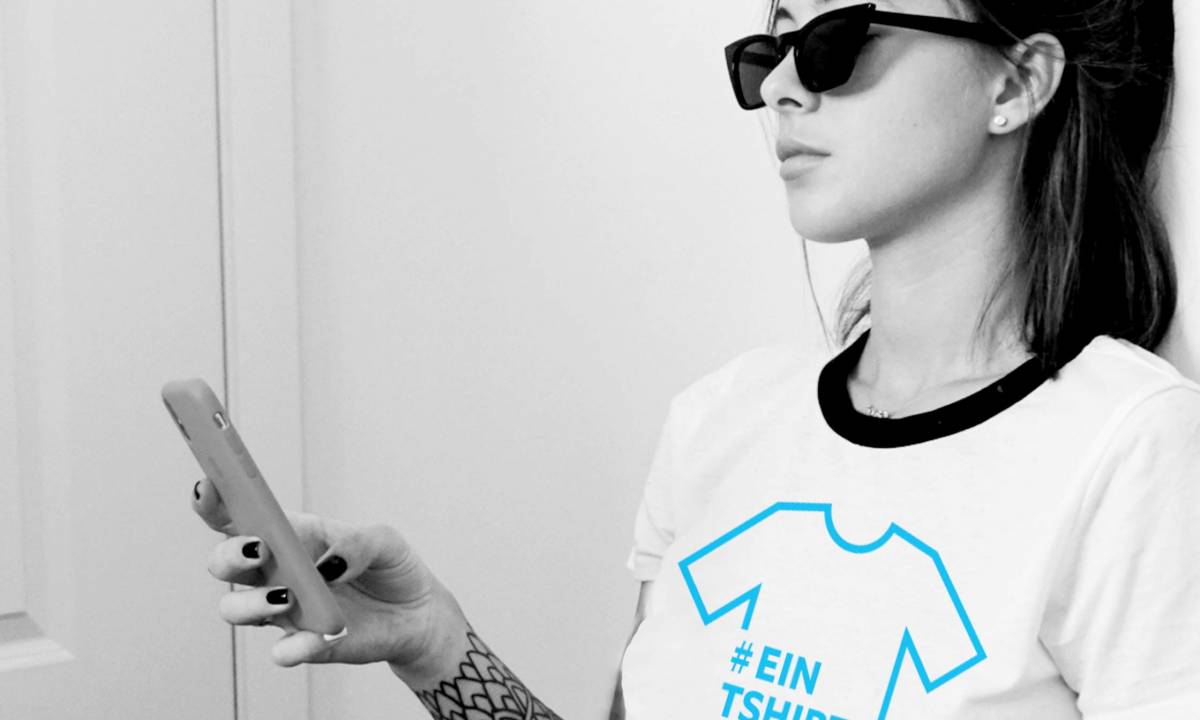Solidarity and sustainability combined with art and culture.
social media & dialogue | arts & raffle | 25 Nov 2021 -- 24 Apr 2022
The message
No piece of clothing embodies fast fashion better than a t-shirt. It is THE symbol for fast fashion that is mass produced. In terms of content and emotion, the #eintshirtzumleben campaign combines education about the problematic social and ecological consequences of fast fashion production with a participatory action that
(a) bring about more empathy and appreciation with the unknown seamstress and
(b) show solutions for a more climate-friendly clothing consumption.
Many actors transform their T-shirts into a political work of art - thus creating a broad public statement for humanity and resource conservation with a role model function.
The objective
The project #eintshirtzumleben aims to create awareness for the consequences and the true price of fast fashion. Many consumers are not aware of the connections between the destructive power of this global exploitation system and their own consumer behavior. Alternative actions are only little known or there is a lack of motivation to make other purchase decisions.
- Through a low-threshold creative T-shirt campaign, social awareness of the true price of fashion will be raised and interest in sustainable purchasing will be strengthened.
- The T-shirt as an emotional hook of the campaign makes clear what connects us as consumers with the seamstresses in the global south. It shows that clothing is more than just a (disposable) product.
- In the context of the project, the T-shirt is given back its true economic, social and ecological value through the personal attribution of an ideal value on the one hand and through the creative examination of the object and its production on the other. This necessary process of cultural reinterpretation is in the interest of all those involved in fashion: from the designer to the textile worker, from the seller to the consumer.
The implementation
- Starting with the launch on Nov 25th, we invited people to tell the story of their favourite t-shirt on social media. Simultaneously, we showed short videos of garment workers from the Global South who told us a bit about themselves – thus enabling dialogue and visibility and thereby connecting both ends of the supply chain.
- Artists of all disciplines were invited to provide artworks to be raffled off for the project, acting act as prominent role models for the campaign. By turning their T-shirts into works of art, they help to reach more distant target groups and increase the media and press coverage of the campaign.
- Education and information: Throughout the project, the campaign website www.eintshirtzumleben.de and FEMNET's SOM channels provided regular information and background reports on the links between climate and clothing and on environmental and human rights violations, as well as handouts and consumer tips for sustainable and fair consumption.
The finale
The campaign concluded with an event on April 24, 2022 (Rana Plaza Memorial Day) in cooperation with the Rautenstrauch-Joest Museum in Cologne and its ReThink Fashion series.
At the heart of the event was the FAIR raffle (FAIRlosung): with the participation of public figures, the artworks (= artistically refined T-shirts) designed and provided by artists* as part of the campaign were raffled off. A raffle ticket was automatically awarded to anyone who had also creatively designed their solidarity statement during the campaign and uploaded it to the campaign website.
agenda:
- Keynote addresses and moderated talks
- Fair fashion show
- Presentation of selected artworks and statements from the solidarity action
- Screens with looped greetings and statements
- Artistic performance on the topic of fast fashion
The evening FAIRlosung (raffle) was the glamorous highlight: it built a bridge to the world of artists and creatives and reached new target groups. Solidarity and sustainability combined with art and culture.
The background
An estimated 60 to 75 million people work in the textile and garment industry worldwide, most of them women, mostly between 16 and 28 years old. They suffer particularly from inhumane working conditions, very low wages, lack of freedom to organize, unpaid and forced overtime, gender-based violence and discrimination, and insecure employment.
The globalized fashion industry, which defines clothing as a consumer product rather than a commodity through steadily decreasing prices and quality, not only puts millions of seamstresses under pressure and creates precarious working conditions. It is also inflicting inherited damage on the environment.
The greenhouse gas emissions of the textile industry amount to around four billion tons of CO2 annually, which is more than all air and sea traffic. Further ecological damage results, for example, from the cultivation of cotton, which requires huge areas of land and large quantities of water, and from the shipping of clothing via containers.
Although the changing environmental conditions will have a significant impact on those who cause climate change, the consumers of the high consumption industrialized countries, it is primarily the countries in the global south that are most affected by climate change. They have hardly any resistance to the increasing natural disasters; the destruction of entire livelihoods is a likely and threatening scenario.

